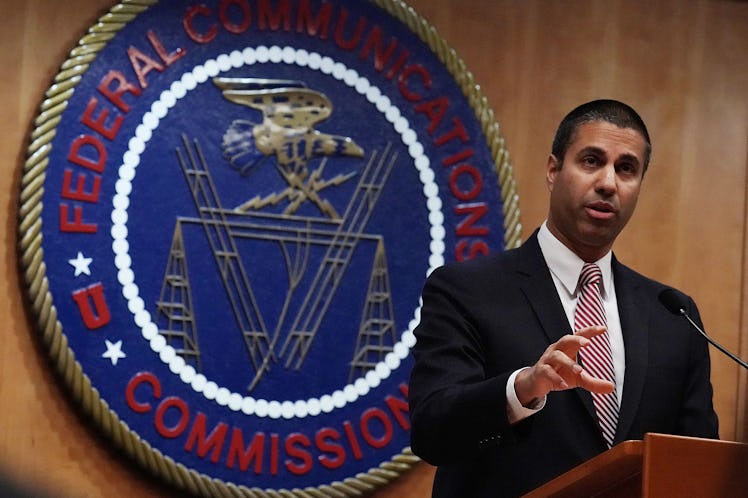
Net Neutrality Could Still Get Saved, So Cross Your Fingers & Call Your Senator
Senate Democrats are on a mission to save the internet, and they're making progress. On May 9, Sen. Ed Markey of Massachusetts filed a petition with signatures from 30 other senators to force lawmakers to vote on regulations that would protect internet freedoms. That means Congress will vote on net neutrality, and the vote is coming up sooner than you think.
Markey's resolution would restore net neutrality by rolling back regulations the Federal Communications Commission (FCC) announced in December. The resolution would restore the standards for internet service providers — which were intended to protect net neutrality by banning internet service providers from favoring or blocking certain content — set under the Obama administration. Advocates for the resolution and net neutrality say they are expecting a vote in the Senate as soon as next week, according to Reuters.
But the push to restore net neutrality won't operate in typical fashion, because its not actually a bill. Instead, it's a Congressional Review Act (CRA) resolution, which is an entirely different beast.
Instead of developing the law in committee, which is the typical process, senators can force a vote on a resolution as long as they can get 30 signatures, which Markey already has, according to The Verge. The CRA allows Congress to reverse any federal regulations, as long as they do it within 60 work days of the regulation being put into place. A key part of the act is that, if a reversal is signed into law, the rules they reverse cannot be reconsidered. In this case, that means that the FCC couldn't try to just pass those rules through again later.
That's great if the resolution passes — but it's questionable if it will pass. Because it's a CRA resolution, the bill only needs a simple majority to pass. Senate Democrats already have 50 votes, with all 49 Senate Democrats and Republican Sen. Susan Collins of Maine on board, and they're confident they can get the last vote, according to The Verge. After that, it would be up to the House to pass a similar resolution before it would go to President Donald Trump's desk, both of which are much bigger undertakings.
So basically, if you care about net neutrality, it's about time for you to hit up that Capitol switchboard and let your representatives know where you stand. Elite Daily has a guide to contacting your senators about net neutrality, but the easiest way to get in touch with your senator is to call the Capitol switchboard at 202-224-3121 and let them know where you're calling from in order to be connected with your senator. Elite Daily also has a script you can follow if you're nervous about talking on the phone.
And you won't be alone in this battle. In response to the resolution, websites such as Twitter, Netflix, Etsy, Reddit and Tumblr have joined a "Red Alert" campaign. The goal is to raise awareness about the vote with the hopes that users will put the pressure on their representatives to vote in favor of the reversal, and it seems to be working. #NetNeutrality was trending on Twitter for much of Wednesday, with support coming a variety of sources, including from the guy who invented the World Wide Web, Tim Berners-Lee. He said in a tweet that he created the web to be an open space.
He wrote:
I invented the web as an open, permissionless space #foreveryone. The FCC’s repeal of #NetNeutrality threatens to take that away. Tell the Senate they must protect net neutrality to keep the web open.
He's not alone. In fact, a poll published Dec. 12 showed that more than 80 percent of voters agreed with protecting net neutrality, and it wasn't a partisan issue. Seventy-five percent of Republicans, 89 percent of Democrats and 86 percent of independents supported it. Only two days after that poll was released, on Dec. 14, FCC chair Ajit Pai announced the rollback that Senate Democrats are now hoping to scrap.
The rollback undid the previous FCC regulations from 2015, which banned "blocking, throttling, and paid prioritization by internet providers," according to The Verge. The regulations prevented internet providers from basically creating a bidding war for visibility by favoring or blocking access to certain content — which would put content creators without much money at a disadvantage. When he announced the change, Pai argued that the regulations placed unfair restrictions on internet service providers (calling the internet one of the free market's biggest successes) and was trying to fix something that wasn't broken.
"There was no problem to solve," he said. "The internet wasn’t broken in 2015. We weren’t living in a digital dystopia."
Even if the internet wasn't broken, many of its users seem to still want open access. It looks like we all will be seeing lots of red for quite a while.